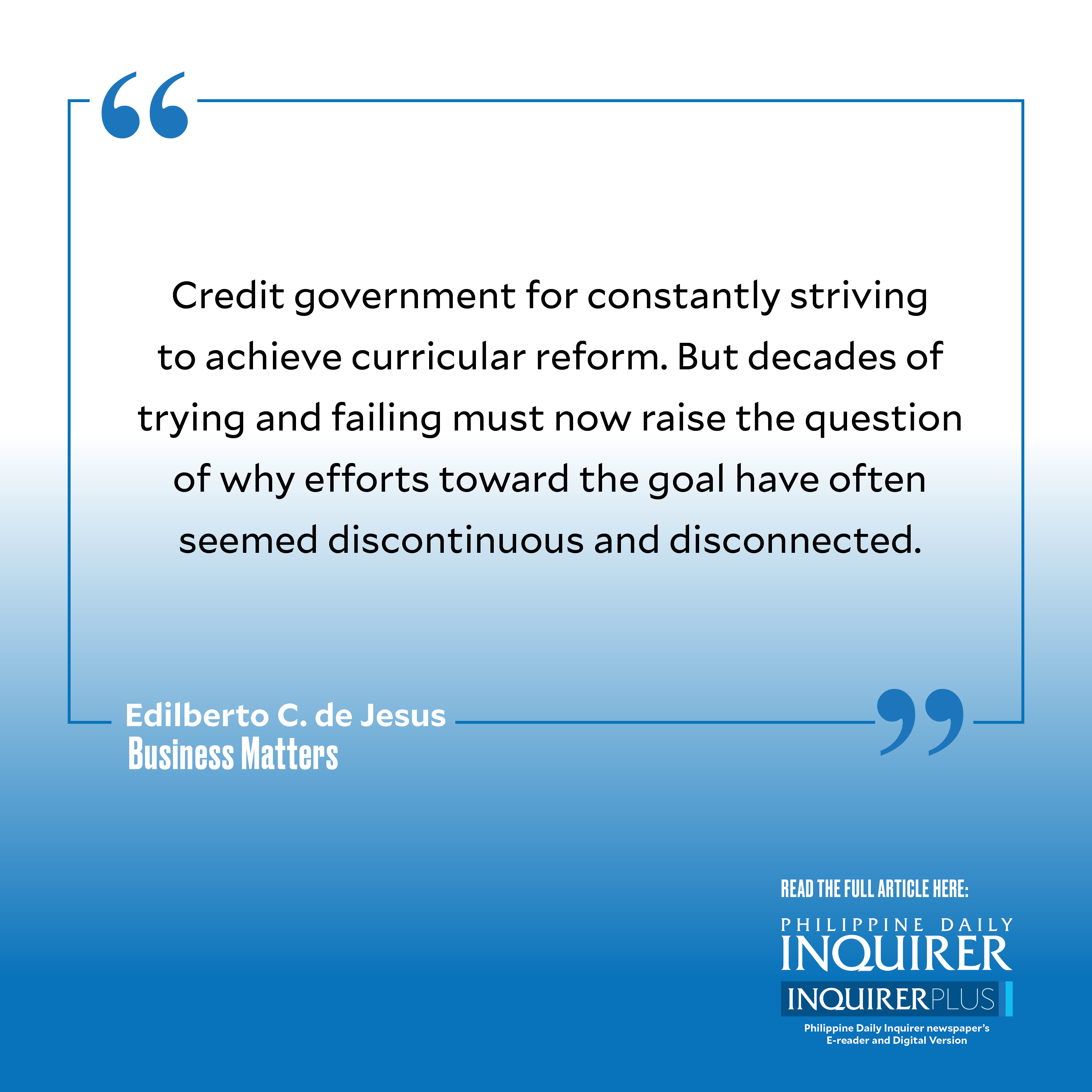Chasing comprehensive curricular change

Delivering a relevant, coherent basic education curriculum has been a continuing concern of the Department of Education (DepEd). In 2002, then DepEd Secretary Raul Roco ordered the implementation of the revised basic education curriculum (RBEC). Planning for K-12 in 2010 required a second, radical restructuring of the basic education cycle. By 2019, even before the pandemic’s impact on education had fully manifested itself, complaints about senior high school (SHS) provoked another curriculum revision. Taking over DepEd in 2022, Vice President Sara Duterte has launched her own curricular reform.
Unusual to see four major curricular reforms in just 20 years, considering that RBEC reportedly took 16 years of research and consultations before it was deemed ripe for implementation. Even more striking, all these efforts addressed the same objective—decongesting the curriculum to allow more time for the fundamental tool courses of language, science and math, and the subjects grounding ethical and civics education. Two decades fall well within the memory of long-staying bureaucrats and politicians and presumably permit learning from experience.
RBEC’s attempt to declog the K-10 curriculum by “integrating” the contents of required subjects into fewer courses proved overly ambitious. With K-12, however, decongestion appeared eminently doable; two additional years would provide adequate time for both foundation skills and sociocivic education. K-12 graduates would be better prepared for on-the-job training in vocational-technical programs. Those going to college, no longer needing remedial courses, could take more subjects in their chosen fields.
With extra time came the temptation to pursue additional competencies through an expanded, integrated, curricular design, synchronized from kinder to SHS. Like radical surgery, this was a more formidable and risky challenge. Experts could create the updated, modernized, improved curricula. Their effective delivery, however, depended on the prior academic preparation of teachers and students giving them the capacity to cope with the new concepts and pedagogy.
The more demanding curriculum required teachers trained to teach the prescribed curriculum and equipped with appropriate learning materials. It also assumed the capacity of the students to absorb what the teachers taught and to retain the learning beyond the next test. Problems beyond the control of DepEd, such as poverty, health, or bullying, could also affect the ability to manage a more difficult curriculum. Studies done over the last 20 years have repeatedly reported concerns about the pressures exerted by these issues on both teachers and students. Imposing a modernized, expanded curricula under these adverse conditions risked sacrificing attainable objectives for more lofty goals more difficult to achieve.
Comprehensive curricular overhaul is not a quick-fix intervention. But it is an appealing response to national education problems. The approach conforms to the centrally planned, top-down style of management favored by bureaucracies. It allows broad scope for demonstrating an activist government doing something. If successful, implementors rightly gain recognition and credit for instituting a historic, legacy achievement. The scale of the effort also justifies a large budget for bureaucrats, consultants, and contractors and the procurement of additional learning materials and equipment.
Comprehensive curricular reforms involve multiple, moving parts and an extended implementation period. With the short attention span of the media and the public, it is almost a fail-safe project for proponents. The results of the intervention will likely emerge only after the executives accountable for its execution have exited their jobs. Left holding the bag, their successors bear the burden of explaining their failure to implement the glorious plans bequeathed to them. Unless they postpone the accounting by launching their own curricular reform.
Credit government for constantly striving to achieve curricular reform. But decades of trying and failing must now raise the question of why efforts toward the goal have often seemed discontinuous and disconnected. The process recalls the punishment imposed on Sisyphus—condemned by the gods to an endless cycle of pushing a rock uphill, losing control just before reaching the peak, compelled to start again from the bottom.
Meanwhile, the learning crisis has pushed grassroots efforts by local communities and their nongovernment organization/civil society organization partners to help their children get the education they need. Their “sariling sikap” (self-help) projects may make only incremental improvements, but better than promised benefits from big-bang curricular reform programs that will come too late for their children.
—————-
Edilberto C. de Jesus is professor emeritus at the Asian Institute of Management.
—————-
Business Matters is a project of the Makati Business Club (makatibusinessclub@mbc.com.ph).




















